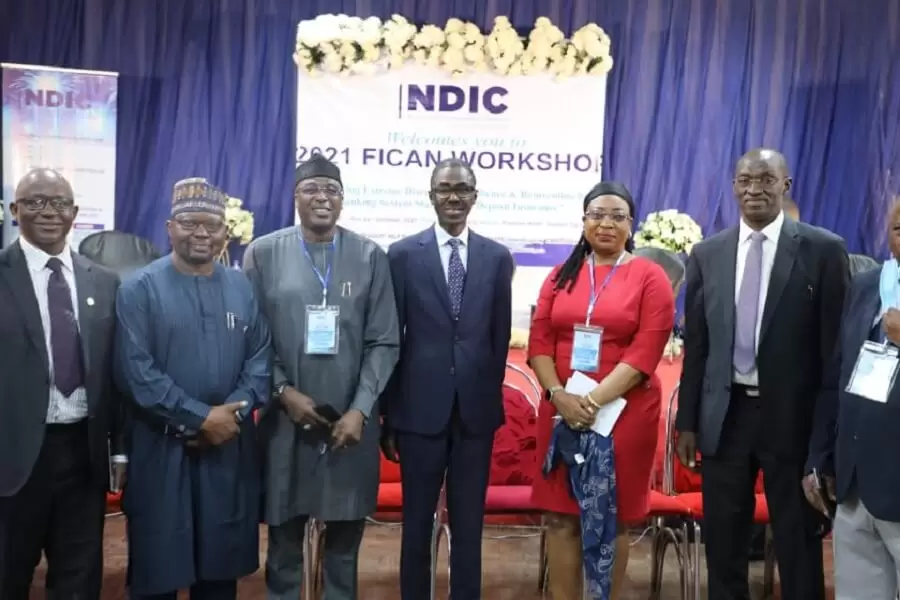NDIC Plans Upward Review Of Deposit Insurance Fund To Prevent Banks Collapse

The Nigeria Deposit Insurance Corporation is planning an upward review of the Deposit Insurance Fund in order to effectively addressed the financial crisis that may arise when a bank collapses.
The Managing Director, NDIC, Bello Hassan, stated this at the 2021 Finance Correspondents Association of Nigeria Workshop held in Ibadan on Wednesday.
Advertisement
He spoke on the theme, “Enduring Extreme Disruptions: Resilience and Reinvention for Banking System Stability & Deposit Insurance.”
The Deposit Insurance Fund is used to meet the primary obligations of the Corporation in the form of payment of guaranteed sums and provision of financial assistance to eligible insured institutions.
The operations of the NDIC are financed from the proceeds of investment such as Treasury Bills and Federal Government Bonds as the Corporation does not receive government subvention for its operations.
The DIF of the NDIC as of March this year is less than N2trn and it had affected the ability of the Corporation to effectively discharge it’s mandate in the areas of distress resolution of failed banks.
Advertisement
For instance, out of the 49 Deposit Money Banks that have been liquidated, the rate of recovery had not really been significant as the NDIC had only been able to pay 100 per cent liquidation dividend of about 10 of them.
Hassan noted that the Corporation is also mulling the review of its determination of premium by banks to make it more risk-based.
He added that the revised framework will enable the NDIC to accurately determine the amount that will be sufficient to meet any liability that might crystallize on the deposit insurer.
He said that the review will be implemented in line with Section (2) subsection (1) of the NDIC Act.
The subsection states that “The Corporation shall have responsibility for giving assistance to insured institutions in the interest of depositors, in case of imminent or actual financial difficulties particularly where suspension of payments is threatened to avoid damage to public confidence in the banking system.”
Advertisement
The NDIC Boss added that the Corporation is also considering other reforms to ensure that it delivers on its mandate to ensure the stability of insured institutions.
Hassan said, “In the area of Deposit Insurance, as a key mandate of the Corporation, we have evolved a strategy which accentuates our existing framework.
“The initiative, strives to ensure that the insurance cover is adequate to support this objective within the banking sector.
“In addition, considering the importance of the optimum Funding Ratio in deposit insurance, we are developing an effective methodology for determining a realistic Target Funding Ratio for the Corporation.
“Furthermore, there have been recent calls on the Corporation to enhance the provision of support, to insured institutions that are facing financial difficulties.
“To this end, we have identified the need to reconsider our framework, to provide realistic terms and conditions that will enable qualifying insured financial institution promptly access technical and or financial support, in line with S.(2)(1)(b) of the NDIC Act, whilst also protecting the Corporation from possible downside risks.”
Advertisement
Speaking on the rationale behind the review, he said, “Essentially we want to make it risk based looking at the various factors that could impact on the viability of the bank to be able to say that maybe this is the number of banks that might likely collapse and if they collapse do we have sufficient funding to be able to make that payout?”
Speaking further, the NDIC boss said that the Corporation is collaborating with relevant stakeholders to ensure that it discharges its responsibilities efficiently without hindrances, following the revocation of licenses of any insured institution by the Central Bank of Nigeria.
He said that this move had become critical, given the need to improve on its processes in resolving liquidated financial institutions.
Hassan said that the theme was apt as it highlights the need for stakeholders to develop strategies that can build resilience into the Nigerian financial system.
On some of the challenges hindering the efficient resolution of the liquidated institutions, Hassan said the slow recovery and realization of assets as well as litigations by erstwhile shareholders and creditors of closed banks can only be addressed through effective collaboration.


